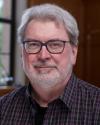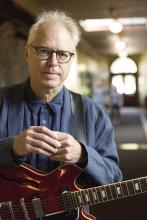Renowned guitarist (and affiliate UW Music faculty member) Bill Frisell and UW Music faculty band Indigo Mist (Cuong Vu, trumpet; Richard Karpen, piano; Ted Poor, drums; Juan Pampin, live electronics; and Steve Rodby, bass) present a program of all-new, original music in this performance made possible with support from the UW Creative Fellowships Initiative, a multi-year program funded by the Mellon Foundation to spur exploration of the nature of creative research at a top research university.
Note: This concert is sold out, but a limited quantity of tickets may be released to the general public on Friday. Check with the ArtsUW Ticket Office on Friday, Jan. 11 in person at 1313 NE 41st Street or by phone at 206.543.4880 (1-800-859-5342 outside of Seattle).
Artist Bios
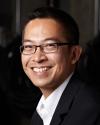
Cuong Vu is widely recognized by jazz critics as a leader of a generation of innovative musicians. A truly unique musical voice, Cuong has lent his trumpet playing to a wide range of artists such as Pat Metheny, Laurie Anderson, and David Bowie.
As a youngster, Cuong's intense dedication and love for music led him to a full scholarship at the New England Conservatory of Music where he received his Bachelor of Music in Jazz studies with a distinction in performance. Transitioning from his studies in Boston, he moved to New York in 1994 and began his career actively leading various groups while touring extensively throughout the world. As a leader, Cuong has released eight recordings, each making critics’ lists of the 10 best recordings of their respective years and has received rave reviews from notable publications such as the New York Times, The New Yorker, Harper’s, the Guardian, BBC Music Magazine, JazzTimes and Downbeat. Each record displays how he has carved out a distinctive sonic territory as a trumpet player, blurring all stylistic borders while developing his own compositional aesthetic and sound world.
Awards and honors that Cuong has garnered include grants from the Royalty Research Foundation, the Donald E. Petersen Professorship, ArtistTrust, 4Culture, CityArts and the Colbert Award for Excellence. Cuong is currently associate professor and chair of Jazz Studies at the University of Washington and was awarded the University of Washington's prestigious Distinguished Teacher Award in his third year on faculty. In 2002 and 2006, Cuong was a recipient of the Grammy for Best Contemporary Jazz Album as a member of the Pat Metheny Group. He’s been recognized as one of the top 50 Jazz Artists in an article called “The New Masters” from the British magazine, “Classic CD” and in 2006 was named the Best International Jazz Artist by the Italian Jazz Critics’ Society. Amazon listed Vu’s “Come Play With Me” on their “The 100 Greatest Jazz Albums of All Time.”
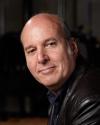
Richard Karpen (b. New York, 1957) is a composer and researcher in multiple areas of music and the arts. His compositions for both electronic media and live performance are widely known, recorded, and performed internationally. Since the early 1980s he has also been in the forefront of the development of computer applications for music composition, interactive performance, and the sonic arts. He is also active as pianist.
Karpen is a Professor of Digital Arts and Experimental Media (DXARTS) and Music Composition at the University of Washington in Seattle. Also at the UW he was founding Director of DXARTS in 2001 and Director of the School of Music from 2009-2020. He has been the recipient of many awards, grants, and prizes, including those from the National Endowment for the Arts, the Bourges Contest in France, and the Luigi Russolo Foundation in Italy. Karpen has composed works for many leading international soloists, such as soprano Judith Bettina, violists Garth Knox and Melia Watras, trombonist Stuart Dempster, flutists Laura Chislett and Jos Zwaanenberg, guitarist Stefan Östersjö, and ensembles such as The Six Tones, JACK Quartet, The Seattle Symphony, and the Harry Partch Ensemble. Karpen is a founding member, with Cuong Vu, of the experimental improvisation ensemble Indigo Mist. As a pianist, Karpen has performed and recorded with Cuong Vu, Bill Frisell, Ted Poor, Steve Rodby, and others. Karpen's compositions and performances have been recorded on a variety of labels including Wergo, Centaur, Neuma, Le Chant du Monde, DIFFUSION i MeDIA, Fleur du Son, Capstone, and RareNoise.

Ted Poor is a New York-born, Seattle-based drummer, composer, and producer whose adventurous, soulful playing has vaulted him to the stages of some of today’s most vital artists. Modern Drummer describes his playing as “adventurous, truly dynamic, and forward-thinking.” A graduate of the Eastman School of Music, Ted has toured and recorded with renowned artists such as Paul Simon, John Scofield, Bill Frisell, Rufus Wainwright, Pat Metheny, Blake Mills, Madison Cunningham, Lizzy McAlpine, Chris Thile, Cuong Vu, Lucy Dacus, Marcus Mumford, and Kurt Rosenwinkel.
Having signed with Verve Records (UMG), his debut album, You Already Know, was released in 2020 to critical acclaim. The album, which is co-produced with Blake Mills, features Andrew D’Angelo, Andrew Bird and Rob Moose. JazzTimes calls the album “profound and moving” and states, “intimate, involving, and lasting, You Already Know balms the senses, wakes them up, slaps them around, and offers positive affirmations.”
A long standing member of Los Angeles based singer/song-writer Andrew Bird’s band, Ted has appeared on numerous records and world-wide tours. He also performed regularly in the house band on the live NPR radio broadcast of Live From Here with Chris Thile (formerly A Prairie Home Companion).
Ted is an Associate Professor of Jazz Studies and the Associate Director of the School of Music at the University of Washington in Seattle. In 2025, he was selected as one of six fellows to the inaugural cohort of the Provost’s Academy – a university-wide leadership development program – to support campus-wide arts initiatives.
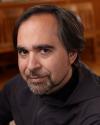
Juan Pampin (b. Buenos Aires, 1967) is Professor of composition at University of Washington and founding faculty member of the Center for Digital Arts and Experimental Media (DXARTS) for which he currently serves as Director.
Pampin received an MA in Composition from Conservatoire National Supérieur de Musique de Lyon, France and a DMA in Composition from Stanford University, where he studied with composer Jonathan Harvey. Juan Pampin's works explore the territory articulated by the concepts of space, memory, and material, using algorithmic composition and signal processing tools of his own development.
Juan Pampin's music compositions, including works for instrumental, digital, and mixed media, have been performed around the world by world-class soloists and ensembles. His work "On Space" –for percussion sextet and 3D electronic sounds– has been recently released on CD as part of Les Percussions de Strasbourg 50th anniversary historical edition box published by Universal France.
